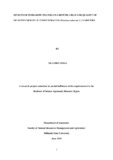Please use this identifier to cite or link to this item:
https://cris.library.msu.ac.zw//handle/11408/2583Full metadata record
| DC Field | Value | Language |
|---|---|---|
| dc.contributor.author | Mlambo, Onias | - |
| dc.date.accessioned | 2017-07-10T12:10:56Z | - |
| dc.date.available | 2017-07-10T12:10:56Z | - |
| dc.date.issued | 2015 | - |
| dc.identifier.uri | http://hdl.handle.net/11408/2583 | - |
| dc.description.abstract | Tobacco is an important cash crop contributing significantly to the Zimbabwean economy. However yield and quality remain very low in the small holder sector despite the availability of potentially high yielding varieties. There are various factors which contribute to lower yields some of which are poor plant spacing combinations which result in either intra specific or inter specific competition. Intra row spacing has the potential to improve yield and quality of the tobacco if properly done, since it has been shown to have greater contribution to competition. Inappropriate intra row spacing particularly the intra row can result in yield and quality penalties. Studies indicate that 35 % of the smallholder farmers are using inappropriate spatial arrangements with a decrease in the intra row spacing in particular. This has been highlighted as a potential yield and quality limiting factor. Higher yielding varieties were also released to improve productivity of the farmers. Three varieties were also released namely T 70, T74 and T76, however their spatial arrangements were not established hence the need to evaluate their spatial arrangements particularly the intra row spacing. A field experiment was conducted to evaluate the effects of intra row spacing on growth, yield and quality of tobacco varieties KRK 26, T70, T 74 and T 76 at Kutsaga Research station. Sixteen treatments comprising four levels of the variety which was the main pot factor and four levels of the intra row spacings which was the sub plot factor were used in a 4 x 4 split plot arrangement in an RCBD with three replications. Assessment for growth, yield and quality parameters was done for leaf expansion, stalk height, saleable yield, grade index and sugar to nicotine ratios. There was an interaction amongst intra row spacing and variety on stalk height, leaf expansion, saleable yield, percentage grade index and sugar to nicotine ratios. Stalk height and leaf geometric mean were statistically higher at wider spacings than at closer spacings for all the varieties. Saleable yield and grade index was statistically higher for all the varieties at wider spacings compared to closer spacings. Desired ratios of sugar to nicotine content were obtained at wider spacings, while at closer spacings ratios surpassed the desired ratios for varieties such as T 74 and T76. It was shown that intra row spacing improved the performance of all the varieties used in this study. Increasing intra row spacing from the recommended spacing of 56 centimetres showed significant improvement for all the parameters assessed in this study except stalk height. The older variety improvement specifically in the quality attributes at wider spacings. Farmers may consider the use of wider spacings of 66 and 76 centimetres to improve yield and quality of their produce for all the tobacco varieties used in this study. | en_US |
| dc.language.iso | en | en_US |
| dc.publisher | Midlands State University | en_US |
| dc.subject | Tobacco | en_US |
| dc.subject | Cash crop | en_US |
| dc.subject | Zimbabwean economy | en_US |
| dc.title | Effects of intra row spacing on growth, yield and quality of selected new flue cured tobacco (nicotiana tabacum l.) varieties | en_US |
| item.languageiso639-1 | en | - |
| item.fulltext | With Fulltext | - |
| item.grantfulltext | open | - |
| Appears in Collections: | Bsc Agronomy Honours Degree | |
Files in This Item:
| File | Description | Size | Format | |
|---|---|---|---|---|
| O.MLAMBO theses 2015.pdf | Full Text | 890.92 kB | Adobe PDF |  View/Open |
Page view(s)
312
checked on Apr 14, 2025
Download(s)
148
checked on Apr 14, 2025
Google ScholarTM
Check
Items in MSUIR are protected by copyright, with all rights reserved, unless otherwise indicated.



